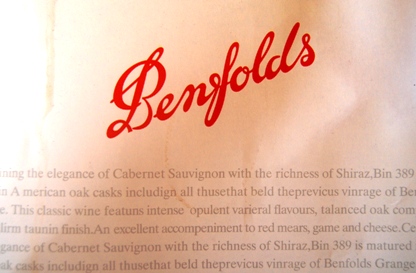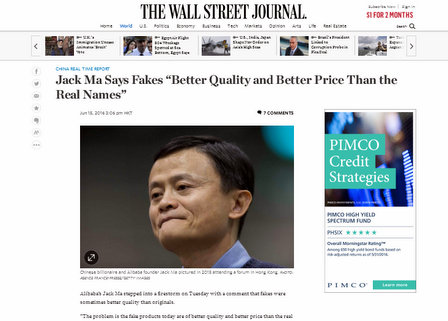
By Jim Boyce | I’m working on a pair of posts about the sad state of Italian wine in China. In short, Italy is the world’s top producer and exporter, possesses a good reputation in China for luxury goods, and has cuisine widely known and loved here, yet is a distant fifth in terms of bottled still wine. Such posts typically end with a nod to the (hopefully positive) future and I planned to give one to Jack Ma of Alibaba, who was quoted in April as saying he will use his huge online retail presence to promote a wine and spirit day on September 9—it’s the ninth day of the ninth month: the Chinese for ‘nine’ sounds like ‘alcohol’—and aims to raise Italy’s share of sales from 6 percent to 60 percent on his sites.
That news created some buzz in the wine trade. So did Ma’s remarks this week about fake products. From Wall Street Journal:
“The problem is the fake products today are of better quality and better price than the real names,†[Ma] said at Alibaba’s investor day in Hangzhou. “They are exactly the same factories, exactly the same raw materials but they do not use the names.â€
Mr. Ma’s comments caused social-media outrage among some who felt he was dodging responsibility for the longstanding presence of counterfeit goods on Alibaba’s online bazaar Taobao. Luxury brands have long criticized Alibaba for not doing more to crack down on fakes and even today, it isn’t difficult to find cheap, fake goods on the website.
Ma’s comments about high-quality fakes aren’t exactly news given the ease with which factories have long been able to finish an official run of, say, designer hand bags or winter jackets and then do an extra shift on the side. While foreign wine producers don’t use that kind of ‘OEM’ model in China, Ma’s comments nevertheless raise the enduring problem of fake or misleading wines being sold here, including via online platforms. And as compared to bags and jackets, fake wines have the potential for far greater health risks.
Most anyone in the wine business here has seen fakes, whether at ‘bricks and mortar’ shops, online retailers or trade fairs: some are glaringly obvious but, in general, packaging and printing quality are increasingly good. They also likely know that China imports a good deal of bulk wine that can end up under local labels, a situation of which most consumers are unaware. And, finally, they have likely heard of cheap wine, notably from Spain, being imported to China at a euro or less per bottle and relabeled or, even, of a Spain-to-France switch being made before the wine leaves Europe. (It’s only fair to say products flow the other way, too, such as tomato puree that is exported from China to Italy, then processed and labeled as ‘produced’ there—see here and here.)
The point is that, regardless of Ma’s remarks, fake or misleading wines have long been a major concern in China. It’s good to see him reported as saying Alibaba will fight such products. It would also be good to know what the industry at large is doing: I’ve seen far more complaining about fakes over the years than I have action to combat them. Given all this, perhaps the September 9 event presents an opportunity for all, a chance not only to promote wine, and especially Italian wine in Alibaba’s case, but also for the industry to reach out to consumers and teach them the best ways to protect themselves against fakes.

Get the free Grape Wall e-newsletter by signing up below.
Grape Wall has no sponsors of advertisers: if you find the content and projects like World Marselan Day worthwhile, please help cover the costs via PayPal, WeChat or Alipay.
Sign up for the free Grape Wall newsletter here. Follow Grape Wall on LinkedIn, Instagram, Facebook and Twitter. And contact Grape Wall via grapewallofchina (at) gmail.com.

Leave a Reply
You must be logged in to post a comment.